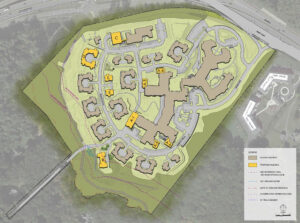
In this map of The Commons campus, the proposed additional units are shown in yellow (click to enlarge).
Citing a long waiting list as well as the area’s aging demographics, The Commons in Lincoln is proposing to add 40 new independent living units along with more parking‚ but some current residents aren’t happy about the prospect.
Because The Commons resides in a zoning overlay district with specific conditions, a two-thirds majority approval is required at Town Meeting next month for the plan to go forward. The Planning Board will hold a public hearing on Tuesday, Feb. 28 at 7 p.m. via Zoom. The agenda and Zoom link will be posted on the Planning Board schedule page. There will also be information sessions in the Lincoln Public Library’s Tarbell Room on Thursday, March 2 from 6–8 p.m. and two sessions on Thursday, March 9 (2–4 p.m. and 6–8 p.m.)
Owner’s representative OnePoint Partners submitted a detailed proposal to the Planning Board on February 6 that calls for 32 new apartments in the existing Flint and Russell buildings and eight freestanding and attached cottages at various locations on the campus. Six of the 11 new units in the Flint building would be designated as affordable housing to be rented at the 80% area median income threshold, increasing the total number of affordable units at The Commons to 14.
The plan also calls for a net addition of 56 parking spaces — 82 new surface spaces at cottages and 18 new garage spaces minus 44 spaces removed for construction. The Commons currently has 259 total units, which includes 90 units in the assisted living/memory care/skilled nursing area that opened in 2016. The current proposal “is the final phase of the complete build out of the Commons,” said Sarah Laffey, partner at OnePoint Partners.
“I think we’re all terribly disappointed. It was like a coup,” said David Levington, a resident at The Commons. “They’re adding more units so we’ll have more people but no more facilities,” he added, saying there already isn’t enough gathering and activity space — a concern expressed by other residents as well. “They’re asking us to spend more time in our rooms.”
“NELPC [New England Life Plan Communities, owners of The Commons] and the onsite management team of The Commons is working closely with the resident council and ensuring that residents’ questions and concerns are addressed,” Laffey said.
Rey LeBlanc, executive director at The Commons, was away and unavailable for comment this week. Several residents who praised his work noted that he was “in a difficult position” as the liaison between residents and the owners of the complex since the expansion was announced.
Benchmark Senior Living and a private equity firm sold The Commons in 2021 to NELPC, a nonprofit entity. The Groves in Lincoln, as it was called when it opened in 2010, was owned by the New England Deaconess Association and Masonic Health Systems of Massachusetts but had an occupancy rate of only 59% in 2013, when it filed for bankruptcy after defaulting on payment of $88.4 million in tax-exempt bonds.
“While the Commons currently operates profitably, the expansion will provide further economies of scale by spreading operating costs over a greater number of units, which should ultimately serve to increase the financial stability of the community,” Laffey said. “As a not-for-profit, the improved financial benefit of this expansion will only serve to shore up The Commons’ own financial resources and strengthen its own financial condition and will not inure to the benefit of an outside owner or investor.”
When NELPC became the owner, it entered into a long-term agreement with Benchmark Senior Living whereby Benchmark would continue in its role as the day-to-day manager of the operation of the Commons.
Lincoln will earn $1.33 million in property taxes from The Commons (Lincoln’s single largest taxpayer) on an assessed value of $92.8 million in fiscal 2023. In fiscal 2022, the assessed value of its property accounted for about 4% of the town’s total, according to the Assessor’s Office. Laffey said it was still unclear how much more tax money the town could expect from the expansion, though a coUrbanize website devoted to the project says projections show a net benefit for the town of more than $200,000 annually. Despite its not-for-profit status, The Commons will continue to pay property taxes, she added.
Voters must approve both the development plan and the amended North-Lincoln Planned Development District at Town Meeting, but the project also needs a signoff from the Planning Board, the Historic Commission (for demolition of a vacant house on the property), the Conservation Commission (to ensure compliance with wetlands laws), and the MassDEP (for approval of a groundwater discharge permit).
Assuming all the permits are acquired, it’s still unknown at this point when construction might take, how long it will last, or whether it will be done in stages or all at once, Laffey said.
Leave a Reply